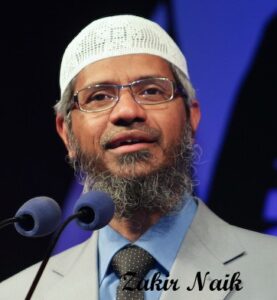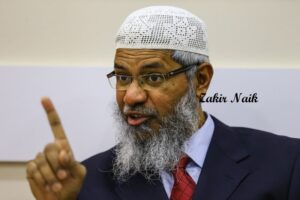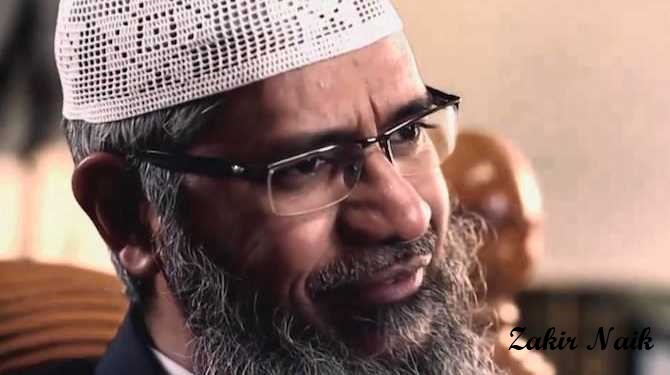
Introduction of Zakir Naik:
Zakir Abdul Karim Naik, born on October 18, 1965, in Mumbai, India, is a well-known Islamic public speaker specializing in comparative religion. A medical doctor by training, Naik shifted his career focus to Islamic preaching in 1991, founding the Islamic Research Foundation (IRF). He is widely recognized for his debates, lectures, and public talks aimed at clarifying Islamic teachings and highlighting perceived contradictions in other religious texts, such as the Bible, Vedas, and Torah. His style of quoting both the Quran and non-Islamic scriptures to draw parallels and contrasts has made him popular among many Muslims worldwide.
Zakir Naik has carved out a niche for himself as a public orator on Islam, engaging in debates and discussions around the similarities and differences between Islam and other world religions, such as Christianity, Hinduism, and Buddhism. Over the years, his speeches and activities have earned him both widespread support and significant criticism. This article delves into the life, works, and controversies surrounding Zakir Naik, providing an in-depth view of a figure who remains influential yet divisive.
Naik’s influence extends globally through his TV channel, Peace TV, which broadcasts his speeches in multiple languages. Despite his wide following, Naik has faced significant controversies and accusations of promoting extremism, leading to bans in several countries. He currently resides in Malaysia, continuing his work on comparative religion from abroad.
Early Life and Education
Zakir Naik was born and raised in Mumbai, India, where he received his early education. He attended St. Peter’s High School and later pursued his higher education at Kishinchand Chellaram College in Mumbai. Unlike many religious scholars, Naik’s academic background is not in theology but in medicine. He earned his degree in medicine from Topiwala National Medical College and BYL Nair Charitable Hospital. This background as a medical doctor adds a unique aspect to his profile, as it distinguishes him from many other Islamic preachers and scholars who usually study in traditional religious institutions.
However, Naik’s interest in comparative religion grew stronger than his medical career, leading him to abandon medicine and devote himself entirely to public speaking and Islamic missionary work. Inspired by the well-known Islamic scholar Ahmed Deedat, who was famous for his public debates with Christian missionaries, Naik began delivering speeches on religious subjects, emphasizing interfaith understanding and dialogue.
Islamic Research Foundation
In 1991, Naik established the Islamic Research Foundation (IRF) in Mumbai. The foundation’s stated goal was to promote the understanding of Islam, correct misconceptions, and foster interfaith harmony through public lectures, videos, and debates. The IRF became Naik’s platform for disseminating his ideas and content, which reached an international audience via satellite television channels and YouTube. Through IRF, Naik popularized his brand of comparative religious analysis, often focusing on perceived contradictions and inconsistencies in other religious texts while offering Islamic teachings as a solution.
Public Speaking and Global Reach
Zakir Naik’s oratory style is marked by his use of quotes from both Islamic scriptures and the sacred texts of other major world religions. His typical approach involves highlighting similarities between these religions, with an underlying message that Islam provides the final and most complete version of divine guidance.
His speeches often focus on issues such as the concept of God, life after death, and the role of women in society. Naik’s global reach grew substantially through his television channel, Peace TV, which broadcasts his lectures in multiple languages to millions of viewers worldwide. He has also published numerous books and DVDs that cover a wide range of topics related to Islam and comparative religion.
Comparative Religion Debates
One of Zakir Naik’s most well-known contributions is his focus on comparative religion. He frequently quotes from religious texts such as the Bible, Vedas, Torah, and other scriptures to demonstrate how they align or diverge from Islamic teachings. For instance, he often discusses the concept of monotheism in these texts, arguing that Islam is the only religion that adheres to pure monotheism, a principle he says other religions have diluted.
In these debates, Naik tends to challenge misconceptions about Islam, particularly those that have arisen in the post-9/11 world. He defends Islamic practices such as polygamy and Islamic criminal law, offering explanations rooted in both Islamic jurisprudence and what he describes as logic and reason. However, his method of engaging with non-Muslim scriptures has been criticized by some scholars, who argue that his interpretations are selective and often misleading.
Controversies and Criticism
Despite his large following, Zakir Naik has not been free from controversy. His speeches, often considered incendiary, have been accused of promoting intolerance. For instance, Naik has been criticized for statements that seem to justify certain forms of violence, particularly in the context of jihad. Some of his remarks have led to accusations of promoting hate speech and terrorism, particularly his comments that have been perceived as supportive of extremist ideologies.
Allegations of Extremism
One of the most significant controversies surrounding Zakir Naik emerged in 2016 when his speeches were alleged to have inspired one of the terrorists involved in the Dhaka attack in Bangladesh. This led to the Indian government banning the Islamic Research Foundation under the Unlawful Activities (Prevention) Act (UAPA), citing the foundation’s role in promoting enmity between different religious groups. In response, Naik left India and has since taken refuge in Malaysia, where he continues his public speaking and broadcasting career, although his activities have been restricted to some extent by Malaysian authorities.
Zakir Naik has also been banned from several countries, including the United Kingdom, Canada, and Bangladesh, where his presence and speeches were deemed a risk to public safety. These bans have further fueled the controversy surrounding his persona, making him a polarizing figure in the global Muslim community.
Zakir Naik Banned in India
Zakir Naik, an Indian Islamic preacher, was banned from India in 2016 due to allegations of promoting extremism and hate speech. The Indian government accused him of radicalizing youth and inciting terrorism. His speeches allegedly inspired one of the attackers involved in the 2016 Dhaka terrorist incident. Naik was charged with money laundering and spreading communal hatred under the Unlawful Activities (Prevention) Act (UAPA).
Following these allegations, his organization, the Islamic Research Foundation (IRF), was also banned in India, and he fled to Malaysia, where he was granted permanent residency. Naik continues to live in Malaysia but remains banned from India, the UK, Canada, and other countries due to similar concerns over his speeches.
Interpretations of Islam
Another layer of criticism comes from within the Muslim world itself. Some Islamic scholars have accused Naik of oversimplifying complex theological matters and presenting a rigid interpretation of Islam that leaves little room for dissenting opinions. His approach, often labeled as Wahhabist or Salafist, has been criticized for promoting a literalist interpretation of Islamic texts.
Moreover, Naik’s method of quoting selectively from non-Islamic religious texts to critique them has also been a subject of concern. Critics argue that this approach lacks scholarly depth and is more about winning debates than fostering genuine interfaith understanding. Despite these criticisms, Naik maintains that his goal is to clear misconceptions about Islam, particularly in an era when Islam is often misunderstood in the global media.
Support and Popularity
Despite the controversies, Zakir Naik has a massive following, especially among young Muslims in countries like India, Pakistan, Malaysia, and the Middle East. His lectures are often seen as accessible and informative, providing answers to complex religious and ethical questions in a straightforward manner. Naik’s emphasis on scientific evidence in the Quran has particularly resonated with younger generations, who appreciate his blending of science and religion in his discourses.
Zakir Naik’s supporters view him as a modern-day Islamic apologist who defends the faith in a world that is increasingly hostile to it. They appreciate his ability to quote from a variety of religious texts, his scientific approach to religious discussions, and his defense of Islamic practices that are often criticized in the media.
Peace TV and Media Presence
Zakir Naik’s reach extends far beyond physical lectures through Peace TV, which he founded in 2006. Broadcasting in English, Urdu, Bengali, and other languages, Peace TV is available in more than 200 countries and has an estimated viewership of over 100 million. The channel airs religious debates, Q&A sessions, and Islamic educational programs, with Naik as the central figure.
However, Peace TV has also been embroiled in controversies, with some countries, including India and Bangladesh, banning its broadcasts. Critics accuse the channel of promoting divisive views and fostering radicalization, although Naik and his team deny these claims, insisting that their content promotes peace and harmony through a better understanding of Islam.

Legacy and Future
As of 2024, Zakir Naik remains a controversial figure. His influence on Islamic preaching, particularly in the realm of comparative religion, is undeniable. However, the controversies surrounding his statements and affiliations have overshadowed much of his work. His legacy is a complex one—while he is celebrated by many for defending Islam in the modern world, he is equally criticized for fostering division and intolerance.
As long as his media platforms, particularly Peace TV, continue to operate, Zakir Naik’s influence is unlikely to wane. His speeches will remain a subject of debate, with some seeing him as a necessary voice defending Islam, while others view him as a symbol of the challenges facing religious discourse in an increasingly polarized world.
